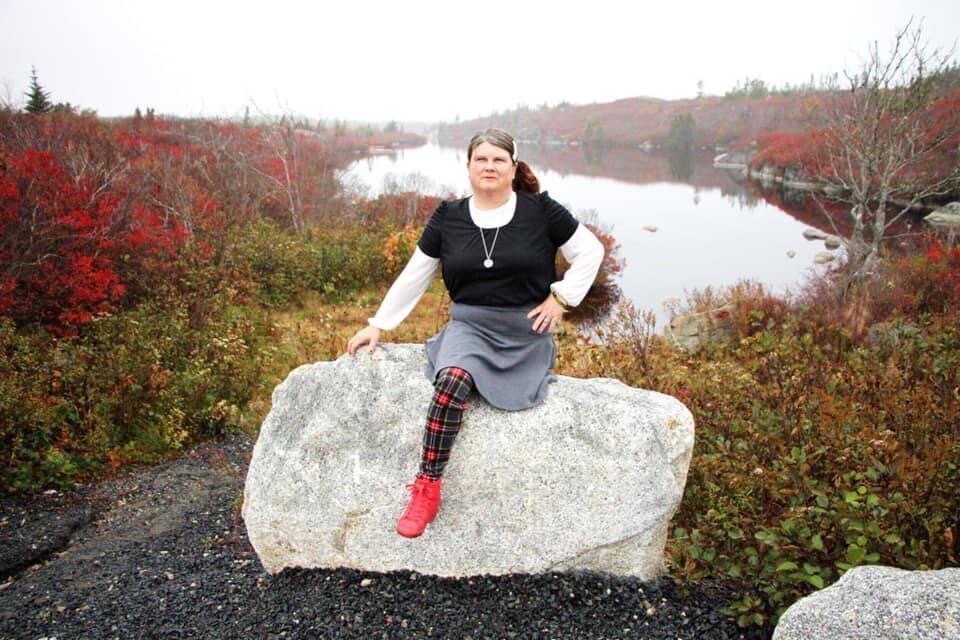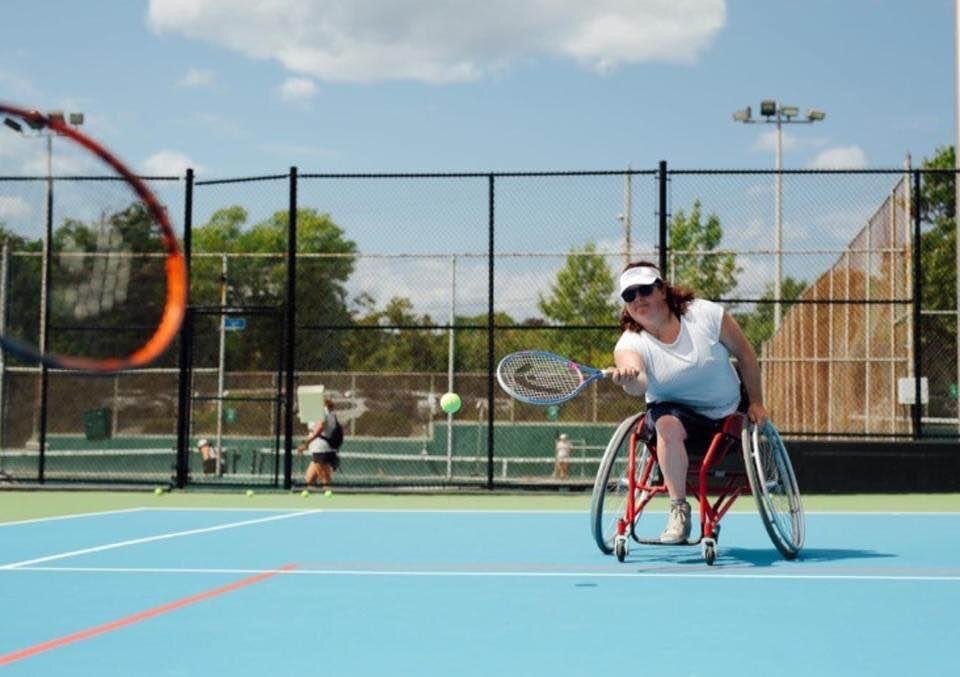How movement builds community: one woman’s story of trial and triumph
Vicki Morton of Prospect, Nova Scotia has an infectious personality and great sense of humour. She’s the type of person you want to be around when you’re feeling down.
What makes her story all the more powerful is that Ms. Morton experienced the traumatic loss of her left leg following an infection in 2011. Despite this setback, she’s found ways to stay active, keep moving and build relationships.
She’s become a wheelchair tennis player and taken up other activities. We asked her to share her story to encourage others who may need help facing a challenge and motivation to try something new.
Childhood memories
As a youth, Ms. Morton attended several tennis camps but was never hooked by the sport. After losing her leg, she rediscovered the activity she remembered as always being fun. She took a chance and it paid off.
“When I was younger, I did tennis camps when I was able-bodied,” she says. “It was a couple of times and nothing consistent. I did play some pickleball after my disability. I went to the Prospect Road Community Centre and played doubles with able-bodied seniors. Sometimes you have to make your own opportunities.”
Silver linings
The seniors were welcoming, supportive and inclusive. Meeting new people and incorporating more movement into her life helped her deal with the life-altering change she’d experienced.
“I was missing the opportunity to move, to participate,” Ms. Morton says. “My silver lining to everything that’s happened is that it’s literally given me the focus and drive to get up and get moving. Movement improves your mood.”
Coach’s corner
To keep moving and to stay positive, she eventually turned to tennis. She took another chance and attended a parasport event to see what was available in Nova Scotia. She discovered many adapted and inclusive activities for people of all ability levels, including beginners.
Ms. Morton’s tennis coach is Marijke Nel, technical director of Tennis Nova Scotia. Ms. Nel is originally from South Africa and has played rugby for her country at the international level. She says she learns more from her parasport students than she teaches them.
“The things they have to conquer to even show up on the court. Their mobility is compromised, so for them to get up, get dressed, get out there, seize the day and commit to participate, it takes a lot more than for an able-bodied person. They’re facing challenges that we don’t even know. They’re inspiring. Every single one of them has a different set of circumstances.”
Creating community
Ms. Nel says one of the benefits of being active and moving more is becoming involved with a community that lifts you up. She says Ms. Morton has become an integral part of the group.
“Vicki has done a fantastic job of keeping momentum, staying relevant and being challenged in many areas. Her positive, optimistic outlook, the fun she has, her zest and zeal for life, and her sense of humour are inspiring. She has an upbeat spirit and it’s contagious. Her optimism carries over to the other para-tennis players.”
Starting from scratch
That level of optimism is inspiring and humbling.
“The beauty of it is: sometimes doing something that you didn’t do able-bodied, but now it’s new to you, means you don’t have any expectations,” says Ms. Morton. “You need something to focus on, you need something positive to make it through the day. If you can find whatever it is that you like to do, it’s going to improve your mental health, improve your physical health and improve your social life.”
Her advice is important for everyone, no matter age, background or ability level.
“Starting from scratch is intimidating,” Ms. Morton says. “You’d be surprised what you can do when you have the drive, determination and commitment. It can be done. I’ve seen other women in their 50s [like Vicki] starting an activity and they’re some of the strongest people I know.”
Six tips to start moving more
Ms. Morton offers this advice to help add more movement and positivity into your life:
Try an activity without any expectations, just show up
Don’t judge yourself, stop negative self-talk like, “I’ll never be good enough”
Start where you’re at activity-wise, its OK if you haven’t done much in a long time
Ease into it, start slowly so you don’t hurt yourself
Small wins add up
Ask yourself what you’ve done today to not be bored or challenge yourself
Strength in numbers
Don’t be afraid to try something new. You’ll be pleasantly surprised at the wonderful people you’ll meet when you get out there and start moving more – people like Ms. Nel and Ms. Morton.
“Yesterday may not have been a good day. Today is a good day. There’s more future good days, as long as you try and look to find something you love to do,” Ms. Morton says.
How to get involved
If you’re interested in trying wheelchair tennis or another para-activity, or have any questions about parasports in Nova Scotia, contact Paul Tingley, Parasport Nova Scotia coordinator with Sport Nova Scotia.
The group has recently purchased four new tennis wheelchairs with a grant from Support 4 Sport. Anyone may use the wheelchairs for free. They also have several multi-use/sport chairs available for players at no cost.
Ms. Morton plays out of the Atlantic Tennis Centre, but there are other places around Nova Scotia for wheelchair tennis and the many other para-activities offered in the province. Check the Parasport Nova Scotia website for upcoming events and opportunities in your area, and most importantly, have fun!



